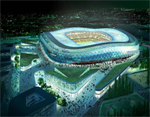The final act will take place on December 10 when the Municipal Council will be called to vote on the resolution to designate the winner with whom the City Hall will sign the partnership contract for the new 35,000-seat stadium in Nice.
We will avoid delving into this file and its history, which dates back many years and for which a legal dispute is still ongoing with the company that won the previous bidding process for the construction of what should have been called the ‘Grand Stadium.’ This history is part of the previous administration during which Jacques Peyrat was Mayor, and it ended in a political crisis.
Today, with the page turned and the clock reset, another process is concluding, which began after the election of Christian Estrosi as mayor. It followed a laborious administrative path to comply with laws and regulations, known as the Competitive Dialogue procedure.
And it is with legitimate satisfaction that the Mayor presented the conclusion of this itinerary: the project and the name of the assignee who will become the City’s partner in this operation, with the estimated costs being 205 million euros (excl. VAT), with the City bearing an annual contribution of 8.3 million euros per year for the 27-year duration of the partnership.
This is a fairly classic project-financing operation that places the construction and maintenance costs (54 million euros are allocated for this, an average of 2 million per year) on the builder, who, in turn, benefits from the advantages of exploitation.
The resident football club (OGCN) will be a tenant for its activities, as will other occasional operators.
Similarly, certain commercial activities will complement the use of the spaces, again benefiting the manager. The real estate aspect that will complete the project hasn’t been fully detailed.
The chosen consortium, with Vinci Concessions as the leader, is of high standing and has already proven itself on national and international levels.
So, by June 2013 (due to the Francophonie Games), the city of Nice will finally have its long-awaited tool, positioning it among the French, even European, cities best equipped with a multifunctional urban stadium.
During the press conference held at Villa Masséna, a place that symbolizes the transition between the past and the future (the Olympic Nice Stadium) of Nice’s life, the Mayor wanted to recall the goals of the project:
– to create a facility contributing to the influence and development of Nice
– to provide the OGCN with an efficient tool allowing it to continue its sporting project
– to build a true multifunctional urban stadium, constituting a structural facility on the scale of the Var Plain
– to design a flagship project in terms of sustainable development
and its essential characteristics:
– the project is a 35,000-seat stadium dedicated to football (rugby practice will also be possible at the highest level), with multifunctionality allowing for seminars as well as concerts and other major events;
– a branch of the National Sports Museum will be established within the project’s perimeter;
– service areas, commercial spaces, and offices that will complete the program, as well as above and underground parking.
To conclude, the Mayor stated: Sport is central to my commitments. The main objective of the sports policy is to make sports accessible to all citizens of Nice.
Access to sports practices has been facilitated by covering the cost of sports licenses and developing a plan for the construction and renovation of sports facilities, such as the renovation of the Palace of Sports, the construction of synthetic fields, the renovation of gyms, and the construction and renovation of swimming pools.
But Nice, a land of sport, also wants to host high-level, national, and international sporting events. It is in this context that the construction of the future Olympic Nice Eco-Stadium is situated (note: a name that could possibly be replaced or integrated with a commercial ‘naming’).
This new stadium will host our resident club, OGC Nice. In addition to these challenges, there is also the issue of the stadium’s location in the Var Plain, within the Eco-Valley. The Olympic Nice Eco-Stadium will thus need to be exemplary in terms of sustainable development and enable the realization of strong economic and social activities.
At the press conference, Christian Estrosi was accompanied by Alain Philippe, Deputy for Urban Planning.
Also present were Eric Ciotti, President of the General Council of the Alpes-Maritimes, the representative of the Prefecture, and Benoit Kandel, First Deputy, as well as many deputies and municipal councilors, notably Dominique Sassone, delegate for the Saint-Isidore Territory.
Absent, however, was Gilles Veissière, Deputy for Sports, which, not for the first time in a public event and especially in such a circumstance, forces us to raise a question that is in the air: is there still a Deputy for Sports in the municipal team?
There were also many representatives of the sports world, including Gilbert Stellardo, president of OGCN, and Jeròme Vandamme, general secretary of CDOS06.


